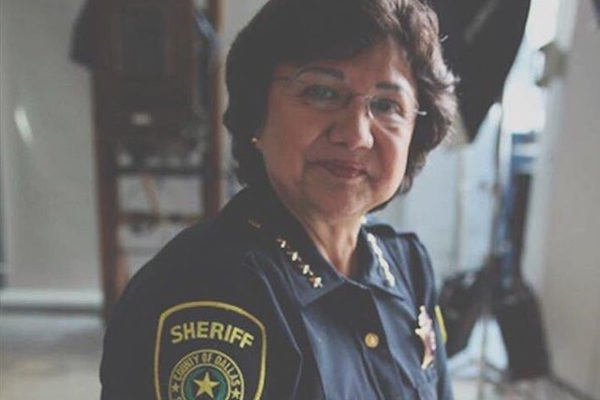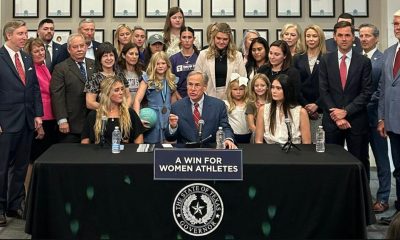National
Lupe Valdez’s campaign for the ‘everyday Texan’ could make LGBT history
Democratic victor in May 22 run-off will take on anti-LGBT Gov. Abbott
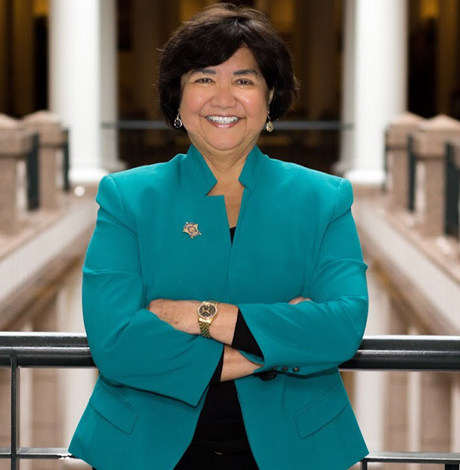
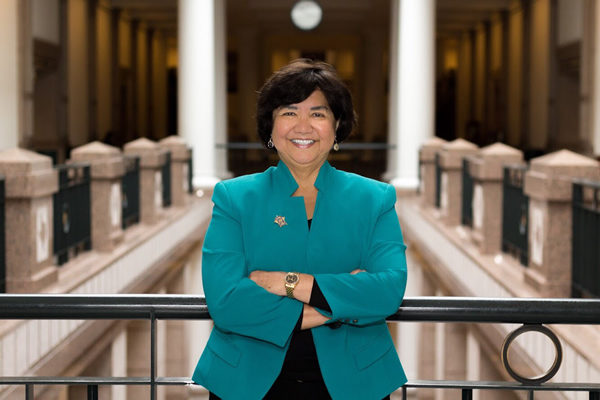
Former Dallas County Sheriff Lupe Valdez is running to become governor of Texas. (Photo courtesy Valdez campaign)
You can count many ways in which former Dallas County Sheriff Lupe Valdez’s election as the next governor of Texas would be a milestone victory.
She could become the first openly gay person elected governor in the United States. She could be the second Latina governor. Her victory as a Democrat would unseat an anti-LGBT incumbent and represent a change for the Republican stronghold state.
But in an exclusive interview Monday with the Washington Blade, Valdez wasn’t focused on those milestones and said the focus of her bid for the Democratic nomination to unseat Texas Gov. Greg Abbott was on the “everyday Texan.”
“The everyday Texan is finding it harder and harder to make ends meet, to get ahead and stay ahead, and our current governor has more interest in his special issue than the everyday Texan,” Valdez said. “I’m committed to making the everyday Texan and, of course, the other folks, the LGBT, the minority actually have a say in the everyday Texas.”
Despite that focus, Valdez, who served four terms as Dallas County sheriff from 2005 to 2017 until she resigned to kick off her campaign, acknowledged being the first openly gay person elected governor in the United States would be significant.
“It would definitely say that Texas is what we actually believe it is — an inclusive state that welcomes all the people,” Valdez said. “And so therefore, I think my election would actually come out and stand strong in saying that this is not the old Texas, this is not the Texas of the past. This is a new Texas that is welcoming and will accept everybody.”
Valdez has competition for the distinction of being the first openly gay person elected governor. Other gay candidates seeking to become governor are Rep. Jared Polis (D-Colo.) in Colorado and state Sen. Rich Madaleno (D-Montgomery County) in Maryland. Bisexual Gov. Kate Brown is seeking re-election in Oregon and bisexual actress Cynthia Nixon is challenging Gov. Andrew Cuomo in New York. In Vermont, transgender businessperson Christine Hallquist is running for governor.
A win for Valdez would be a win for the LGBT community not just because she could be the first openly gay person elected governor, but also because she’d be taking out one of the most anti-LGBT governors in the country.
Among other things, Abbott has signed an anti-LGBT “religious freedom” adoption bill into law, urged the Texas Supreme Court to undermine the 2015 ruling for marriage equality nationwide, and called a special session of the state legislature for the sole purpose of passing anti-transgender bathroom legislation, which lawmakers ultimately rejected.
Valdez said Abbott’s tenure has “been harmful to everything, not just the LGBT,” including Texans as a whole and other minorities, such as Muslims and immigrants.
“I don’t believe that’s the Texas brand, and I want to show him,” Valdez said. “Discrimination is not acceptable in any shape, so we need to continue to fight against the bathroom bill. I’m trying to find a decent way to say this madness that is ‘show me your papers’ bills and discrimination bills. They’re unpopular with the majority of Texas. Yes, there’s a small percentage that is in favor, but the majority of Texas is not, so we need to start governing for the majority of Texas.”
If elected governor, Valdez said she’d take Texas in the opposite direction and seek to pass pro-LGBT bills, including legislation enacting a statewide prohibition on anti-LGBT discrimination.
“I’m going to fight for everybody, including the LGBTQ community,” Valdez said. “We have to have a comprehensive non-discrimination protections bill. We have to have a hate crimes protections bill, and we have to find some way of having health care that is culturally competent. Say that in a mouthful, but it’s true that we need to be sensitive to the HIV folks and transgender folks.”
With studies showing 40 percent of homeless youth are LGBT, Valdez also said making changes to assist the LGBT homeless population is an important task.
“You have the homeless youth that are kicked out, and there’s still old Texas attitudes, and they’re kicked out of the homes because they’re LGBTQ,” Valdez said. “In a homeless situation, the parents have to sign for the child to be able to go into a shelter. If he’s LGBTQ, the parent doesn’t even want to talk to them. How are they going to sign for it? We have to make arrangements for that.”
The potential of Valdez to become the first openly gay governor and unseat an anti-LGBT incumbent won her the endorsement of the Gay & Lesbian Victory Fund, which declared its support for Valdez in March. The Human Rights Campaign hasn’t yet made an endorsement in the race.
Annise Parker, who’s CEO of the Victory Fund and won historic elections herself to become an openly gay mayor of Houston, said having a lesbian Latina defeat an anti-LGBT governor would “have enormous consequences for Texas and the entire country.”
“With a primary win this month, Lupe will set up a general election battle that puts positive solutions against the divisive politics Gov. Abbott thrives on – and in a deep red state with a legislature hostile to LGBTQ equality,” Parker said. “Electing a Democratic governor in Texas will be tough, but a victory would be transformational. With Lupe in the governor’s mansion, we know hateful legislation is dead on arrival, and legislators will be forced to focus on policies to improve people’s lives, not make them more difficult.”
But Valdez has to overcome an additional step before she wins the Democratic nomination to take on Abbott. Although Valdez won a plurality of the vote in the March 6 Democratic primary, the race now proceeds to a run-off with businessperson Andrew White, who was the runner-up. The run-off is set for May 22.
White has his own faction of support, including an endorsement from the Houston GLBT Political Caucus, but Valdez said her experience makes her the clear choice to become the Democratic nominee.
“I’m going to laugh here,” Valdez said. “I’m an Army veteran, I was a federal agent for over 20 years, I was the sheriff of Dallas County for the last 13 years. By the way, Dallas County is the ninth largest county in the United States, the sheriff’s department is the seventh largest department in the United States. I oversaw over 2,500 employees and I had a budget of over $160 million. The experience is what already talks.”
Valdez faces an uphill challenge in her bid to unseat Abbott in a traditionally Republican state. A Quinnipiac poll in April found she trails him by nine points, with Abbott leading 49-40 percent. Meanwhile, White has a similar standing and trails the incumbent by seven points, with Abbott leading 48-41 percent.
But Valdez said that poll is a good sign because Democrats in Texas in recent years have never had anything close to those numbers.
“Excuse me? Ten points is the closest we’ve been in over 10 years,” Valdez said. “The prior people that have run against have not gotten that close, and we haven’t even started running against him. We’re not even calling him out or going to him on anything. We’re just fighting right now in the Democratic primary. If we’re within 10 points, that’s the best any candidate has done in quite a while, and we haven’t even started with him.”
Valdez also said she isn’t afraid of a challenge, citing her beginnings in San Antonio as one of eight children of parents who were migrant farm workers.
“My favorite phrase on that, people keep saying, ‘This is an uphill challenge,'” Valdez said. “Excuse me? What kind of other challenges do we have? As an LGBTQ Latina from very humble beginnings, I don’t know if you know my story…I grew up in the poorest zip code and the highest crime in San Antonio. What other challenge have I had except uphill? That’s all we know is an uphill battle. So, I’m getting pretty good at these.”
With President Trump having occupied the White House for more than a year, Valdez also reflected on his presidency. In the aftermath of a transgender military ban, revocation of bathroom protections for transgender students and “religious freedom” executive actions, Valdez said Trump betrayed his campaign promise to be a friend to LGBT people.
“He started out his campaign saying that he was going to have LGBTQ rights, and he started out with that, but then he turned around and pulled some of the stuff he’s been pulling,” Valdez said. “All that says is — how do you politely say two-faced? I don’t know how you can politely say he said something for the campaign just to get people on your side, and then you turn around and do something else.”
Asked whether she’d seek to shield the Texas National Guard from the transgender military ban, Valdez said she’d “fight to stop some of his actions,” recalling her own experience being a lesbian in the military under an anti-gay ban at the time of the Vietnam War.
“Back then, there was no protection,” Valdez said. “I know what it feels like to be left out there with no protection. I know what it feels like to not have people support you. So, of course, I’m going to fight to put these protections [in]. The transgender people are of value to the National Guard, to the military, they’re of value. They wouldn’t have been accepted in the first place if they weren’t of value.”
Pressed on how she’d fight the transgender military ban, Valdez talked about statewide LGBT non-discrimination protections and the recent fight against the bathroom bill.
“We’re going to go back to the same thing, the comprehensive non-discrimination protections, the hate crimes protections and there is already a strong push in Texas for transgender protections,” Valdez said. “The bathroom bill was totally against transgender, and there were so many middle-class families who came up and fought and said, ‘Look at my child. My child is transgender and they’re causing no harm to your school.’ So there’s already a strong fight in Texas and we will build on that so we can pass laws to stop the discrimination against the transgender.”
On whether sexual orientation has emerged as an issue in her campaign, Valdez said it hasn’t come up and that marks a significant change from when she first ran for sheriff in 2004.
“I’m going to tell you a little story and that sometimes causes me pain. When I ran for sheriff 13 years ago, I went to the Latino Police Officers’ Association. I went to their leadership, and I said, ‘I would appreciate your endorsement,'” Valdez said. “One member literally said to me, ‘We are not going to endorse an f-ing lesbian. You will embarrass us and you will cause us nothing but embarrassment to our association.’ I mean, I can literally remember walking out of there with literally my heart in my feet because it was so painful.”
But Valdez said her victory as sheriff in the 2004 election proved that anti-gay member’s predictions were incorrect and “a majority of Dallas did not feel that way.”
“I was an out lesbian when I won,” Valdez said. “So, the majority of Dallas did not feel that. Are there people that still feel that way? Yes. But I don’t believe that is the majority of Texas. I do believe there are some loud, very loud voices against it. But I do believe they’re in the minority. As you become less positive, less powerful, you yell harder. And these people are yelling very hard because they’re not going to be the majority.”
Although Valdez said she hasn’t yet encountered opposition based on her sexual orientation in her gubernatorial campaign, she expects that to change when she secures the Democratic nomination and challenges Abbott head on.
“Remember we’re in the Democratic primary,” Valdez said. “I don’t think those will come until we get in the general. Most of the Democrats in Texas are pretty progressive and the state party has taken a stand for non-discrimination protections against LGBTQ…So, I don’t think I’ll run into those issues in the primary. Where those issues will come up, I’m sure, is in the general.”
Valdez’s race isn’t the only statewide contest in Texas attracting national attention. Another high-profile race is Rep. Beto O’Rourke’s (D) bid to unseat Sen. Ted Cruz (R), who’s up for re-election this year and has a strong anti-LGBT record that includes introducing a constitutional amendment that would have blocked the U.S. Supreme Court’s ruling for same-sex marriage.
A recent Quinnipiac poll put O’Rourke within striking distance of Cruz in November. Although the poll found 47 percent of Texas residents support Cruz, 44 percent back O’Rourke.
Valdez was initially reluctant to comment on the U.S. Senate race, saying she’s focused on her own, but conceded having both herself and O’Rourke on the Democratic ticket in November would have significant potential advantages.
“Of course, I want him to win,” Valdez said. “Of course, I would work with him and together both our campaigns would bring in some strong votes. He’s weak on the Hispanic vote. I’m very strong on the Hispanic vote, so a combination of both of us would more than likely bring out more voters.”
With Valdez and O’Rourke mounting strong challenges in Texas, the state could soon shift from being a “red” state to “purple” state, and a “blue” if demographics keep shifting to more a diverse population.
But Valdez said the change for a difference in election outcomes is already present because “Texas is not a red state, it’s a non-voting state” and her effort is focused on getting to the polls voters who haven’t cast ballots before.
“We’re going to go the grassroots and pull out these folks that have not been voting,” Valdez said. “And the fact is that happened with Hillary, all these people just assumed that Hillary was going to win, so we’re not going to go vote. I think Trump has been the best thing that happened to the Democrats because they’re all excited and they don’t want to see this happen again, so you have more people coming out to vote.”
Valdez said the victories of Democrats in recent special elections throughout the country and the strong Democratic turnout in the March 6 primary in Texas demonstrates Democrats are ready to head to the polls to make change.
“Something is happening, something is awakening our voters,” Valdez said. “I don’t know if it’s new voters, or the old voters just deciding maybe they better get out and vote, but we’re going to push for both of those, we’re going to push for new voters and we’re going to push for the voters that haven’t voted before. If you don’t vote, this is what we get. You need to vote to change it. You want stuff like Trump to continue, stay home, but none of us want that, so we’re going to push and get our message out and get folks to get out and vote.”
Minnesota
Reports say woman killed by ICE was part of LGBTQ community
Renee Nicole Good shot in Minneapolis on Wednesday

A U.S. Immigration and Customs Enforcement agent shot and killed a woman in Minneapolis as she attempted to drive away from law enforcement during a protest on Wednesday.
The Star Tribune newspaper identified the victim as Renee Nicole Good, 37, a Minneapolis resident who lived blocks from where she was shot in the Central neighborhood, according to reports. Donna Ganger, Good’s mother, told the Star Tribune that her daughter lived in the Twin Cities with her wife.
Multiple videos of the shooting have gone viral on social media, showing various angles of the fatal incident — including footage that shows Good getting into her car and attempting to drive away from law enforcement officers, who had their weapons drawn.
In the videos, ICE agents can be heard telling Good to “get out of the fucking car” as they attempted to arrest her. Good, who press reports say was married to a woman, ended up crashing her car into an electric pole and other vehicles. She was later transported from the scene of the shooting and died at the hospital.
President Donald Trump defended the ICE agent on Truth Social, saying the officer was “viciously” run over — a claim that coincides with Homeland Security Secretary Kristi Noem’s assessment of the situation. Noem, a South Dakota Republican, insisted the officer “fired defensive shots” at Good after she attempted to run over law enforcement agents “in an attempt to kill them — an act of domestic terrorism.”
Multiple state and local officials disputed claims that the shooting was carried out in self-defense at the same time Noem was making those assertions.
An Instagram account that appears to belong to Good describes her as a “poet and writer and wife and mom and shitty guitar strummer from Colorado; experiencing Minneapolis, MN,” accompanied by a rainbow flag emoji.
A video posted to X after the shooting shows a woman, reportedly her wife, sitting on the ground, crying and saying, “They killed my wife. I don’t know what to do.”
“We’ve dreaded this moment since the early stages of this ICE presence in Minneapolis,” Mayor Jacob Frey said during a Wednesday press conference. “Having seen the video myself, I want to tell everybody directly that [the DHS’s claim of self-defense] is bullshit. This was an agent recklessly using power that resulted in somebody dying, getting killed.”
“I have a message for ICE. To ICE, get the fuck out of Minneapolis,” Frey continued. “We do not want you here. Your stated reason for being in this city is to create some kind of safety, and you are doing exactly the opposite. People are being hurt. Families are being ripped apart. Long-term Minneapolis residents that have contributed so greatly to our city, to our culture, to our economy are being terrorized, and now somebody is dead. That’s on you, and it’s also on you to leave.”
Across the Capitol, members of the House and the Senate condemned the actions of the officer.
“There’s no indication she’s a protester, there’s nothing that at least you can see on the video, and therefore nothing that the officers on the ground could see that identify her as someone who’s set out to try to do harm to an ICE officer,” U.S. Sen. Elizabeth Warren (D-Mass.) said Wednesday night on MS NOW’s “The Weeknight.”
“There is no evidence that has been presented to justify this killing,” House Minority Leader Hakeem Jeffries (D-N.Y.) said in a statement on his website. “The masked ICE agent who pulled the trigger should be criminally investigated to the full extent of the law for acting with depraved indifference to human life.”
“ICE just killed someone in Minneapolis,” U.S. Rep. Robert Garcia (D-Calif.) the highest-ranking Democrat on the House Oversight Committee, posted on X. “This administration’s violence against communities across our country is horrific and dangerous. Oversight Democrats are demanding answers on what happened today. We need an investigation immediately.”
In a statement to the Advocate, Human Rights Campaign President Kelley Robinson wrote, “Today, a woman was senselessly killed in Minneapolis during an ICE action — a brutal reminder that this agency and the Trump regime put every community at risk, spreading fear instead of safety. Reports that she may have been part of the LGBTQ+ community underscore how often the most vulnerable pay the highest price.”
National LGBTQ Task Force President Kierra Johnson also responded to Good’s death.
“We recognize and mourn the loss of Renee Nicole Good and extend our condolences to her family, loved ones, and community,” said Johnson in a statement. “This loss of life was preventable and reprehensible, particularly coming at the hands of federal agents.”
National
Top 10 LGBTQ national news stories of 2025
Trump, Supreme Court mount cruel attacks against trans community

President Trump’s anti-LGBTQ agenda dominated national news in 2025, particularly his cruel attacks on trans Americans. Here are our picks for the top 10 LGBTQ news stories the Blade covered in 2025.
10. Trump grants clemency to George Santos

President Donald Trump granted clemency to disgraced former Long Island Rep. George Santos. Santos was sentenced to 87 months in federal prison after pleading guilty to wire fraud and aggravated identity theft and had served just 84 days of his more than seven-year sentence. He lied to both the DOJ and the House Ethics Committee, including about his work and education history, and committed campaign finance fraud.
9. U.S. Olympics bans trans women athletes
The United States Supreme Court decided in 2025 to take up two cases — Little v. Hecox and West Virginia v. B.P.J.— both of which concern the rights of transgender athletes to participate on sports teams. The cases challenge state laws under the Equal Protection Clause of the 14th Amendment, which prevents states from offering separate boys’ and girls’ sports teams based on biological sex determined at birth. Both cases are set to be heard in January 2026. The developments follow a decision by the United States Olympic & Paralympic Committee to change eligibility rules to prohibit transgender women from competing in women’s sporting events on behalf of the United States, following Trump’s Executive Order 14201, “Keeping Men Out of Women’s Sports.”
8. FDA approves new twice-yearly HIV prevention drug
The U.S. Food and Drug Administration on June 18 approved a newly developed HIV/AIDS prevention drug that needs to be taken only twice a year, with one injection every six months. The new drug, lenacapavir, is being sold under the brand name Yeztugo by pharmaceutical company Gilead Sciences. According to trial data, 99.9 percent of participants who received Yeztugo remained HIV negative. This emerging technology comes amid direct cuts to HIV/AIDS research measures by the Trump–Vance administration, particularly targeting international HIV efforts such as PEPFAR.
7. LGBTQ people ‘erased’ from gov’t reports
Politico reported in March that the Trump–Vance administration is slashing the State Department’s annual human rights report, cutting sections related to the rights of women, people with disabilities, the LGBTQ+ community, and more. Members of Congress objected to the removal of the subsection on “Acts of Violence, Criminalization, and Other Abuses Based on Sexual Orientation, Gender Identity or Expression, or Sex Characteristics (SOGIESC)” from the State Department’s Annual Country Reports on Human Rights Practices.
In a Sept. 9 letter to Secretary of State Marco Rubio, U.S. Reps. Robert Garcia (D-Calif.), Julie Johnson (D-Texas), and Sarah McBride (D-Del.) urged the department to restore the information or ensure it is integrated throughout each report, noting that the reports serve as key evidence for asylum seekers, attorneys, judges, and advocates assessing human rights conditions and protection claims worldwide.
6. Trump admin redefines ‘sex’ in all HHS programs

The Trump administration canceled more than $800 million in research into the health of sexual and gender minority groups. More than half of the National Institutes of Health grants scrapped through early May involved studies of cancers and viruses that disproportionately affect LGBTQ people.
The administration is also pushing to end gender-affirming care for transgender youth, according to a new proposal from the Department of Health and Human Services, NPR reported. The administration is considering blocking all Medicaid and Medicare funding for services at hospitals that provide pediatric gender-affirming care. “These rules would be a significant escalation in the Trump administration’s attack on access to transgender health care,” said Katie Keith, director of the Center for Health Policy and Law at Georgetown University.
5. FBI plans to label trans people as ‘violent extremists’
The Human Rights Campaign, Transgender Law Center, Equality Federation, GLAAD, PFLAG, and the Southern Poverty Law Center condemned reports that the FBI, in coordination with the Heritage Foundation, may be working to designate transgender people as “violent extremists.” The concerns followed a report earlier this month by independent journalist Ken Klippenstein, who cited two anonymous national security officials saying the FBI is considering treating transgender subjects as a subset of a new threat category.
That classification—originally created under the Biden administration as “Anti-Authority and Anti-Government Violent Extremists” (AGAAVE) — was first applied to Jan. 6 rioters and other right-wing extremists. Advocates said the proposal appears to stem from the false claim that the assassination of Charlie Kirk was committed by a transgender person.
4. Pentagon targets LGBTQ service members

Acting in agreement with the growing anti-LGBTQ sentiment from the Trump administration, during a televised speech to U.S. military leaders at Marine Corps Base Quantico in late September, Defense Secretary Pete Hegseth denounced past military leadership for being too “woke,” citing DEI initiatives and LGBTQ inclusion within the Department of Defense. During the 45-minute address, Hegseth criticized inclusive policies and announced forthcoming directives, saying they would ensure combat requirements “return to the highest male standard only.”
Since 2016, a Navy replenishment oiler had borne the name of gay rights icon Harvey Milk, who served in the Navy during the Korean War and was separated from service under other than honorable conditions due to his sexuality before later becoming one of the first openly LGBTQ candidates elected to public office. In June 2025, the ship was renamed USNS Oscar V. Peterson.
The U.S. Air Force also announced that transgender service members who have served between 15 and 18 years would be denied early retirement and instead separated from the military without benefits. Transgender troops will be given the option of accepting a lump-sum payout offered to junior service members or being removed from service.
In February, the Pentagon said it would draft and submit procedures to identify transgender service members and begin discharging them from the military within 30 days.
3. Trump blames Democrats, trans people for gov’t shutdown
Republicans failed to reach an agreement with Democrats and blamed them for the government shutdown, while Democrats pointed to Republicans for cutting health care tax credits, a move they said would result in millions of people paying significantly higher monthly insurance premiums next year. In the White House press briefing room, a video of Democrats discussing past government shutdowns played on a loop as the president continued to blame the Democratic Party and “woke” issues, including transgender people.
“A lot of good can come from shutdowns. We can get rid of a lot of things. They’d be Democrat things,” Trump said the night before the shutdown. “They want open borders. Men playing in women’s sports. They want transgender for everybody.”
2. Supreme Court joins attacks on LGBTQ Americans

The U.S. Supreme Court issued multiple rulings this year affecting LGBTQ people. In Mahmoud v. Taylor (6–3), it ruled that public schools must give parents advance notice and the option to opt children out of lessons on gender or sexuality that conflict with their religious beliefs. The case arose after Montgomery County, Md., schools added LGBTQ-inclusive storybooks to the elementary curriculum.
In June, the court upheld Tennessee’s ban on gender-affirming care for transgender minors, protecting similar laws in more than 20 states. Lawmakers and advocates criticized the ruling, and a coalition of seven medical associations warned it strips families of the right to direct their own health care.
The Court also allowed the Trump administration to enforce a ban on transgender military personnel and to implement a policy blocking passports with “X” gender markers, with the federal government recognizing only male and female designations.
1. Trump inaugurated for second time
President Donald Trump became the 47th president after winning Wisconsin, securing 277 of the 270 electoral votes needed. His guidebook, Project 2025, outlined the Republican Party’s goals under his new leadership, with a particular focus on opposing transgender rights.
Trump nominated openly gay hedge fund executive Scott Bessent as U.S. Treasury Secretary, a role he eventually assumed. Bessent became the highest-ranking openly gay U.S. government official in American history.

Honorable mention: The war on rainbow crosswalks escalates around the country
Florida Gov. Ron DeSantis (R) ordered state transportation officials to remove a rainbow-colored crosswalk in Orlando next to the Pulse gay nightclub, where 49 mostly LGBTQ people were killed in a 2016 mass shooting. The move follows a July 1, 2025, announcement by U.S. Transportation Secretary Sean Duffy that, with support from President Trump, the department adopted a “nationwide roadway safety initiative” that political observers say could be used to require cities and states to remove rainbow street crosswalks.
Crime & Justice
San Fernando Valley LGBTQ+ community center Somos Familia Valle is trying to rebuild from a “traumatizing” break-in
This Monday, burglars stole $8,000 worth of essential materials from the organization.

In the early hours of Monday morning, burglars broke through three walls of the Sun Valley LGBTQ+ community center Somos Familia Valle. They rummaged through two main rooms and left with $8,000 worth of technology: 15 Chromebooks, two iPads, a camera, two microphones, and a large audio system that staff members used to host programs like Queer Yoga and Vogue Classes. “I was scared because I was wondering if it was a hate thing,” said Somos Familia Valle co-founder and president Kevin Al Perez.
Perez had woken that day with his usual routine of checking the building’s cameras and Wi-Fi systems remotely. Suddenly, he jolted after noticing they’d been turned off for hours. Since he was away, he asked his father to check on the space. “Everything’s fine,” his father replied, who said that the main door looked untouched.
After stepping inside, the damage became clear. Pieces of walls were torn out and strewn across the floor, items were hastily tossed aside, and the technology normally utilized for the center’s phone banking program, fitness classes, and community workshops were missing. “This is our first space,” Perez told the Blade, noting how devastating this break-in has been, both physically and mentally, for himself and his community members.
Somos Familia Valle began as a grassroots movement in 2014, when Perez and other LGBTQ+ locals noticed the absence of a Pride parade in the San Fernando Valley. Together, they organized a vibrant, joyous celebration of queer identity, planting the roots of what is now an intersectional space that uplifts and pours into the Valley’s diverse residents. For nearly a decade, they hosted programs at other community spaces, such as the Sherman Oaks East Valley Adult Center, before moving into their brick-and-mortar location on Sheldon Street.
With this physical space, Perez and Somos Familia Valle’s community organizer, Damiana Cano, have evolved that core mission with new branches. It is important for them to not only prioritize queer education and empowerment but also voter engagement mobilization, know your rights workshops, computer literacy classes, and physical health programs to fuel the safety and strength of people who seek support from the center.
“As someone who was born and raised in this community, I think it is so fulfilling and beautiful that LGBTQ people of all generations have a safe space to come together and create beautiful art here in the Northeast SFV,” Cano wrote to the Blade. “Over time, this…became more than a community; these people are my family.”
In response to the break-in, the community has stepped up. Perez opened a GoFundMe campaign, and within three days, it has surpassed its initial $8,000 goal. Right after the break-in, the center halted all programming. Now, with this wave of support, Perez says that these offerings, which include a TGI support group, mental health task force, Pride committee, and Queer Country will likely resume in January.
Somos Familia Valle will also move forward with their upcoming “Queer Together” holiday party, which will be held at their center on Sheldon Street. Perez told the Blade that the walls have been repaired, and he is determined to honor the resilience of the center and the people it serves. “It’s heartbreaking and traumatizing [but] they’re not going to take that away from us,” Perez said.
The break-in is currently under investigation by local law enforcement agents. To support Somos Familia Valle, their GoFundMe campaign is linked here.
Kristie Song is a California Local News Fellow placed with the Los Angeles Blade. The California Local News Fellowship is a state-funded initiative to support and strengthen local news reporting. Learn more about it at fellowships.journalism.berkeley.edu/cafellows.
National
As house Democrats release Epstein photos, Garcia continues to demand DOJ transparency
Blade this week sat down with gay House Oversight Committee ranking member

Democrats on the House Oversight Committee have released new photos from Jeffrey Epstein’s email and computer records, including images highlighting the relationship between President Donald Trump and the convicted sex offender.
Epstein, a wealthy financier, was found guilty of procuring a child for prostitution and sex trafficking, serving a 13-month prison sentence in 2008. At the time of his death in prison under mysterious circumstances, he was facing charges of sex trafficking and conspiracy to traffic minors.
Among those pictured in Epstein’s digital files are Trump, former President Bill Clinton, former Trump adviser Steve Bannon, actor and director Woody Allen, economist Larry Summers, lawyer Alan Dershowitz, entrepreneurs Richard Branson and Bill Gates, and Andrew Mountbatten-Windsor.
One photo shows Trump alongside Epstein and a woman at a Victoria’s Secret party in New York in 1997. American media outlets have published the image, while Getty Images identified the woman as model Ingrid Seynhaeve.
Oversight Committee Democrats are reviewing the full set of photos and plan to release additional images to the public in the coming days and weeks, emphasizing their commitment to protecting survivors’ identities.
With just a week left for the Justice Department to publish all files related to Epstein following the passage of the Epstein Files Transparency Act, which requires the Justice Department to release most records connected to Epstein investigations, the Washington Blade sat down with U.S. Rep. Robert Garcia (D-Calif.), the ranking member on the Oversight Committee to discuss the current push the release of more documents.
Garcia highlighted the committee’s commitment to transparency and accountability.

“We’ve said anything that we get we’re going to put out. We don’t care who is in the files … if you’ve harmed women and girls, then we’ve got to hold you accountable.”
He noted ongoing questions surrounding Trump’s relationship with Epstein, given their long history and the apparent break in friendship once Trump assumed public office.
“There’s been a lot of questions about … Donald Trump and Jeffrey Epstein. They were best friends for 10 years … met women there and girls.”
Prior to Trump’s presidency, it was widely reported that the two were friends who visited each other’s properties regularly. Additional reporting shows they socialized frequently throughout the 1990s and early 2000s, attending parties at Trump’s Mar-a-Lago resort in Florida and Epstein’s residences. Flight logs from an associate’s trial indicate Trump flew on Epstein’s private jet multiple times, and Epstein claimed Trump first had sex with his future wife, Melania Knauss, aboard the jet.
“We’ve provided evidence … [that leads to] questions about what the relationship was like between Donald Trump and Jeffrey Epstein.”
Garcia stressed the need for answers regarding the White House’s role in withholding information, questioning the sudden change in attitude toward releasing the files given Trump’s campaign promises.
“Why is the White House trying to cover this up? So if he’s not covering for himself … he’s covering up for his rich friends,” Garcia said. “Why the cover up? Who are you hiding for? I think that’s the question.”
He confirmed that Trump is definitively in the Epstein files, though the extent remains unknown, but will be uncovered soon.
“We know that Trump’s in them. Yeah, he’s been told. We know that Trump’s in them in some way. As far as the extent of it … we don’t know.”
Garcia emphasized accountability for all powerful figures implicated, regardless of financial status, political party, or personal connections.
“All these powerful men that are walking around right now … after abusing, in some cases, 14‑ and 15‑year‑old girls, they have to be held accountable,” he said. “There has to be justice for those survivors and the American public deserves the truth about who was involved in that.”
He added that while he is the ranking member, he will ensure the oversight committee will use all available political tools, including subpoenas — potentially even for the president.
“We want to subpoena anyone that we can … everyone’s kind of on the table.”
He also emphasized accountability for all powerful figures implicated, regardless of financial status, political party, or relationship with the president.
“For me, they’re about justice and doing the right thing,” Garcia said. “This is about women who … were girls and children when they were being abused, trafficked, in some cases, raped. And these women deserve justice.”
“The survivors are strong.”
Deputy White House Press Secretary Abigail Jackson issued a statement regarding the release the photos, echoing previous comments from Republicans on the timing and framing of the photos by the Oversight Committee.
“Once again, House Democrats are selectively releasing cherry-picked photos with random redactions to try and create a false narrative,” Jackson said.
“The Democrat hoax against President Trump has been repeatedly debunked and the Trump administration has done more for Epstein’s victims than Democrats ever have by repeatedly calling for transparency, releasing thousands of pages of documents, and calling for further investigations into Epstein’s Democrat friends,”
In a press release on Friday, Garcia called for immediate DOJ action:
“It is time to end this White House cover-up and bring justice to the survivors of Jeffrey Epstein and his powerful friends. These disturbing photos raise even more questions about Epstein and his relationships with some of the most powerful men in the world. We will not rest until the American people get the truth. The Department of Justice must release all the files, NOW.”





(Photo courtesy of the U.S. House Oversight Committee)
National
White House deadnames highest-ranking transgender official
Rachel Levine’s portrait altered at HHS

Admiral Rachel Levine — the first transgender person ever confirmed by the U.S. Senate and the highest-ranking trans official in American history — had her official portrait in the Humphrey Building altered, with staff replacing her correct name with her deadname, the name she has not used since 2011.
NPR first reported the change, and an HHS spokesperson confirmed to the outlet that Levine’s portrait had recently been altered. A digital photograph obtained by NPR shows Levine’s former (male) name typed on a placard beneath the portrait, placed under the glass of the frame.
Levine served as a four-star admiral in the U.S. Public Health Service Commissioned Corps under the Biden-Harris administration and was appointed the 17th assistant secretary for health.
During her tenure, Levine oversaw the Commissioned Corps and helped lead national public-health initiatives, including the federal COVID-19 response and vaccination strategy; efforts to address rising syphilis infection rates; HIV/AIDS prevention and treatment programs; and strategies to combat the opioid epidemic, particularly through expanded harm-reduction approaches for the communities most affected.
The Trump-Vance administration’s decision to publicly deadname Levine is widely viewed within the trans community as demeaning and disrespectful. The move comes amid a series of federal policy reversals targeting LGBTQ Americans, particularly trans youth seeking gender-affirming care.
Those actions include: weakening workplace protections for LGBTQ employees; limiting restroom access; downgrading gender-identity discrimination cases; pressuring hospitals to end gender-affirming care; cutting HIV research and prevention funding; removing LGBTQ crisis resources; restricting access to trans-inclusive medical policies for veterans and young people; supporting trans sports bans and threatening funding for teams that include trans athletes; and forcing schools and universities to eliminate DEI and LGBTQ offices, inclusive curricula, gender-neutral bathrooms, and books or training materials addressing LGBTQ issues.
The Trump–Vance administration has also expanded federal censorship by removing LGBTQ language from surveys, agency websites, Smithsonian materials, and human-rights reports; blocking Pride recognitions; creating federal communications that misgender trans women; imposing passport and travel barriers for trans Americans; lifting protections for trans service members; limiting benefits and care for LGBTQ veterans; and pressuring states, universities, and hospitals to end trans-inclusive policies under threat of losing federal research, education, or Medicaid funds. The administration has additionally deported LGBTQ asylum seekers to unsafe conditions, removed LGBTQ issues from global human-rights reporting, and escalated anti-trans rhetoric at public events.
These actions stand in stark contrast to Levine’s public-health record. As assistant secretary for health, she worked to expand LGBTQ+ health data collection, promote equitable vaccine distribution, strengthen national health-equity initiatives, and reduce care disparities experienced by historically underserved communities, including LGBTQ populations. Within HHS, she led councils and task forces dedicated to reducing structural barriers to care and improving community outcomes.
Before joining the federal government, Levine oversaw health and safety for nearly 13 million residents as Pennsylvania’s physician general from 2015–2017 and as Pennsylvania secretary of health from 2018–2021.

Asked by NPR about the alteration of her official portrait, Levine responded that it had been an honor to serve as assistant secretary for health, adding: “I’m not going to comment on this type of petty action.”
National
Study shows ‘pervasive mistreatment of LGBTQ people by law enforcement’
Findings claim nationwide police misconduct, including in D.C., Va., Md.

The LGBTQ supportive Williams Institute, an arm of the University of California at Los Angeles School of Law, released a report last month citing multiple research studies conducted over the past 25 years showing past and “ongoing” mistreatment of LGBTQ people by law enforcement throughout the United States.
“Findings show that LGBTQ communities – particularly LGBTQ people of color, youth, and transgender and gender nonconforming individuals – have faced profiling, entrapment, discrimination, harassment, and violence from law enforcement for decades, and this mistreatment continues to be widespread,” according to a Williams Institute statement.
“Experiences of police mistreatment may discourage LGBTQ people from reporting crimes or engaging with law enforcement,” Joshua Arrayales, the report’s lead author and Williams Institute Law Fellow said in the statement.
“Reporting crimes is essential for accurate crime statistics, property allocation of crime prevention resources, and support services that address the unique needs of LGBTQ survivors,” he said.
The 59-page report cites the findings of two dozen or more studies and surveys of LGBTQ people’s interaction with police and law agencies for the past 25 years through 2024 conducted by various organizations, including the ACLU, the National Coalition of Anti-Violence Programs, the Williams Institute, and local government agencies.
But the report does not provide a breakdown of where police abuse against LGBTQ people occurred by specific police departments or locations. Instead it provides survey research findings of large groups of LGBTQ people who responded to a survey in different locations of the U.S.
Among other things, those surveys have found “LGBTQ people are more likely than non-LGBTQ people to report being stopped by police, searched by police, arrested, and falsely accused of an offense,” the Williams Institute statement accompanying the report says. “LGBTQ people also report substantial rates of verbal harassment, physical harassment, sexual harassment, and assault,” it says.
The report itself cites surveys of LGBTQ people’s interactions with police in D.C., Baltimore, and Virginia but does not give specific cases or identify specific police departments or agencies.
“A 2022 study based on interviews with 19 Black transgender women from Baltimore and Washington, D.C. identified a theme of re-victimization while seeking help from police,” the report says. “One participant noted that male officers asked what she did to cause her own abuse,” according to the report.
“Other participants expressed that when a knowledgeable officer was present, such as an LGBTQ+ liaison, they felt more inclined to reach out for help,” it says.
The report also states, “A 2024 study based on interviews with 44 transgender people in Virginia documented two instances of transgender women being pulled over for broken tail lights and then being mistreated once officers discovered they were transgender based on their IDs.” The report does not reveal the specific location in Virginia where this took place.
Other locations the report cites data on anti-LGBTQ conduct by police include New York City, Chicago, Los Angeles, Palo Alto, Newark, N.J., and Austin and San Antonio in Texas.
The full report can be accessed at williamsinstitute.law.ucla.edu.
National
Faith leaders denounce anti-transgender attacks
‘You are holy. You are sacred. We love you.’

This past Trans Awareness Week, 10 heads of diverse religious traditions issued a statement proclaiming that transgender, intersex, and nonbinary people are worthy of love, support, and protection. Led by Rev. Dr. Sofía Betancourt, president of the Unitarian Universalist Association, representatives from the Universal Fellowship of Metropolitan Community Churches, The Fellowship of Affirming Ministries, the Union for Reform Judaism, the Presbyterian Church, the Christian Church (Disciples of Christ), The Episcopal Church, the United Church of Christ, and Reconstructing Judaism called out the violent and systemic persecution of trans, nonbinary, intersex, and queer people–proclaiming that their faith and their humanity urged them to affirm that trans, intersex, and quere people are “sacred” and “holy.”
Their statement comes at a critical time. Over the past three months, Trump and his Cabinet’s anti-trans rhetoric has only intensified, with a report released late September by journalist Ken Klippenstein in which national security officers leaked that the FBI is planning to classify trans people as “extremists.” By classifying trans people as “Nihilistic Violent Extremists,” far-right groups would have more “political (and media) cover,” as Abby Monteil reports for them, for anti-trans violence and legislation.
While the news is terrifying, it’s not unprecedented – the fight against trans rights and classification of trans people as violent extremists was included in Project 2025, and in the past several weeks, far-right leaders’ transphobic campaign has expanded: boycotting Netflix to pressure the platform to remove trans characters, leveraging anti-trans attack ads in the Virginia governor’s race and banning professors from acknowledging that trans people exist. In fact last month, two Republican members of Congress called for the institutionalization of trans people.
It seems that the government shutdown was predicated, at least partially, on Trump’s own anti-trans policies that were attached as riders in the appropriations bill.
It’s a dangerous escalation of transphobic violence that the Human Rights Campaign has classified as an epidemic. According to an Everytown for Gun Safety report published in 2020, the number of trans people murdered in the U.S. almost doubled between 2017 and 2021. According to data released by the Gun Safety report from February 2024, 34 percent of gun homicides of trans, nonbinary, and gender expansive people remain unsolved.
As Tori Cooper, Director of Community Engagement for the Transgender Justice Initiative for the Human Rights Campaign Foundation, this violence serves a purpose. “The hate towards transgender and gender expansive community members is fueled by disinformation, rhetoric and ideology that treats our community as political pawns ignoring the fact that we reserve the opportunity to live our lives full without fear of harm or death,” Cooper said.
The faith leaders came out in this statement to affirm that it is their spiritual and human imperative to call out this escalating violence and protect trans, nonbinary, intersex, and queer people. The leaders acknowledge that historically and today, religion is used as a weapon of hate to degrade and deny the human dignity of LGBTQ+ peoples. The Supreme Court is hearing Chiles v. Salazar, a case about the constitutionality of a Colorado ban of conversion therapy for minors, with the majority of conversion therapy practices being faith based. And despite the Supreme Court declining to hear a case challenging the constitutionality of same-sex marriage conferred in Obergefell v. Hodges, efforts to end marriage equality remain ongoing with Katy Faust’s End Obergefell movement.
“During a time when our country is placing their lives under increasingly serious threat,” the statement reads, “there is a disgraceful misconception that all people of faith do not affirm the full spectrum of gender – a great many of us do. Let it be known instead that our beloveds are created in the image of God – Holy and whole.”
The faith leaders argue that commendation of LGBTQ peoples and religiously motivated efforts to deny their dignity and rights is not the belief of all faith communities, and far-right Christian nationalist communities and others who uphold homophobia and seek to exact it writ large in the United States do not speak for all faith leaders.
This is a critical piece of the statement and builds on historical precedence. During the 1980s AIDS crisis, when far-right Christian leaders like Jerry Falwell, one of the founders of the Moral Majority, stated that HIV was “God’s punishment” for LGBTQ+ people and indicative of a broader moral decline in America, affirming faith communities came out to affirm the dignity and divinity of queer people. As funeral homes and churches refused to prepare the dead and bury them, some faith communities stepped up to say that these homophobic leaders do not speak on behalf of all people of faith.
In 1985, the United Church of Christ General Synod urged its member congregations to claim and declare themselves “Open and Affirming,” in order to express their welcome and support for LGBTQ+ people, and two years later, the Church of the Brethren issued a statement titled “A Call to Compassion” where conference members urged member congregations to speak out boldly against discrimination, provide direct care to people with HIV/AIDS, and actively educate themselves and others to stop the spread of fear and prejudice surrounding the disease.
Just one year later, the Evangelical Lutheran Church in America Church Council issued a statement, “AIDS and Church’s Ministry of Caring,” which outlined the ways in which welcoming, ministering to and advocating on behalf of people with HIV/AIDS is critical to their mission. Even the US Conference of Catholic Bishops, which earlier this month banned gender-affirming care at Catholic hospitals, issued a statement in 1987 calling discrimination against people with HIV/AIDS “unjust and immoral,” and denouncing the label of “innocent” or “guilty” patients.
Thus, the faith leaders’ statement this past week builds on a rich history of faith communities fighting the stigma that far-right faith groups perpetuate about LGBTQ+ people and committing to action. What sets this latest statement apart is its decidedly interfaith heart, which speaks to the history of the Pride Interfaith Service in Washington, DC that was first started by a group of faith leaders and lay people who gathered at the AIDS Memorial quilt.
As the statement reads, “Our scriptures vary, but they share a common conviction. As we make justice our aim we must give voice to those who are silenced. Our shared values, held across many faiths, teach us that we are all children of God and that we must cultivate a discipline of hope, especially in difficult times. As such, we raise our voices in solidarity to unequivocally proclaim the holiness of transgener, nonbinary, and intersex people, as well as the recognition of the entire spectrum of gender identity and expression.”
The statement ended by arguing that they need to call out the violence they are witnessing. Their silence, they argue, would be in compliance and reinforce the idea that homophobic religious leaders and lay people speak on behalf of all people of faith. Their statement is not only words, however, it is a written promise affirming the dignity and holiness of queer people but also to protect them in the face of increasing violence and persecution.
“When people of faith and conscience stay silent in the face of oppression, we are all made less whole. When people of faith and conscience speak out against that which violates the sacred in its own name, we have the power to stay the hand of sin. Transgender, nonbinary, and intersex people are vulnerable today,” the statement concluded.
“Our faiths, our theologies, and our practices of prophetic witness call on us to say with one voice to transgender people among us: ‘You are holy. You are sacred. We love you. We support you, and we will protect you.’”
Crime & Justice
SoCal gay couple alleges Uber driver refused them service and “chased” them with a bat
Los Angeles attorney Brian Breiter is assisting the couple with civil claims against the driver and Uber, calling into question queer safety on rideshare apps.

Note: The couple’s names have been kept anonymous by their attorney to avoid retaliation from Uber. They will be referred to as “J.” and “D.”
On Saturday, Nov. 8th, J. and D. shared a kiss during their Uber ride in San Diego’s queer-friendly North Park neighborhood when, suddenly, their driver pulled off the freeway. When the couple alerted him that he had taken the wrong exit, the driver said he would be letting them out because he did not “support [their] kind,” according to J.
It was at this point that J. began to record the interaction. In a 21-second clip provided to the Blade, J. and D. can be heard questioning the driver why they are being told to leave the vehicle when they had not yet arrived at their destination. Stranded in unfamiliar surroundings late at night, the couple responded in shock when the driver replied: “Because I don’t support you.”
In the video, J. asked explicitly: “You don’t support gay people?” to which the driver said: “No.”
J. and D. allege that after pulling over, the driver stepped out, retrieved a bat from his trunk, and cocked it back as if to strike them. At this point, the couple bolted, frantically running while dialing for the police. They ducked behind cars, panicking and hiding while waiting for officers to arrive. “I haven’t experienced another time in my life where I would say that I really was in fear of dying,” D. told the Blade. “We were just hiding there, hoping that we were going to survive at that point.”
Since then, the couple has sought out Los Angeles attorney Brian Breiter to represent them in a civil claim against the driver and Uber. Breiter explains that he is in the process of drafting the lawsuit, which includes claims of intentional infliction of emotional distress and civil assault against the driver as well as claims of negligent hiring, screening and training against Uber.
Breiter told the Blade that since his office sent a representation letter to Uber, there has been minimal contact from the company — no concessions, apology or accountability.
But, a spokesperson claims they have taken one concrete action in the case.
“Everyone deserves to feel safe, welcome, and respected when using Uber. Hate has no place in our society, and we do not tolerate any form of discrimination on the Uber platform,” an Uber spokesperson wrote to the Blade. “As soon as this was reported to us, we banned the driver from the platform.”
While this bit of news has been “relieving” for J. and D., it does not necessarily signal Uber’s readiness to improve their hiring, screening or training guidelines to protect their LGBTQ+ riders. “Removing this one driver does not prevent this from happening again,” Breiter told the Blade. “Unless Uber implements meaningful safety measures and proper screening, LGBTQ+ passengers and the public at large remain at risk.”
In October 2023, Uber Mexico created an LGBTQ+ mobile training initiative to strengthen their non-discrimination policy — but it remains unclear whether this training has been implemented more widely throughout the platform.
LGBTQ+ safety on these rides continues to be an understated issue, and J. and D.’s stories are not singular. On online forums, queer people have long shared their experiences with harassment and discrimination based on their gender and sexual identities. They take to the internet to warn others, understanding that: when there is no systemic change, they must rely on one another to be heard and to protect their communities.
Today, J. and D. do not feel safe using Uber or other rideshare apps. They are constantly reassessing and second-guessting their behaviors in public, for fear of violence. “We’re both very traumatized over this incident. [Recently] we went to dinner and we didn’t want to hold hands in public,” said J. “Because when we did kiss in the Uber, this man hate-crimed us and chased us down the street…It has just been really overwhelming and emotionally and physically draining.”
Kristie Song is a California Local News Fellow placed with the Los Angeles Blade. The California Local News Fellowship is a state-funded initiative to support and strengthen local news reporting. Learn more about it at fellowships.journalism.berkeley.edu/cafellows.
National
Serving America, facing expulsion: Fight for trans inclusion continues on Veterans Day
Advocates sue to reverse Trump ban while service members cope with new struggles

President Trump signed EO 14183, titled “Prioritizing Military Excellence and Readiness,” on Jan. 27, directing the Department of Defense (DoD) to adopt policies that would prohibit transgender, nonbinary, and gender-nonconforming people from serving in the military.
The Trump-Vance administration’s policy shift redefines the qualifications for military service, asserting that transgender people are inherently incapable of meeting the military’s “high standards of readiness, lethality, cohesion, honesty, humility, uniformity, and integrity,” citing a history or signs of gender dysphoria. According to the DoD, this creates “medical, surgical, and mental health constraints on [an] individual.” Regardless of their physical or intellectual capabilities, transgender applicants are now considered less qualified than their cisgender peers.
On Jan. 28, 2025, GLBTQ Legal Advocates and Defenders (GLAD) Law and the National Center for LGBTQ Rights (NCLR) filed Talbott v. Trump, a federal lawsuit in the U.S. District Court for the District of Columbia challenging the executive order. Originally filed on equal protection grounds on behalf of six active service members and two individuals seeking enlistment, the case has since grown to include 12 additional plaintiffs.
The Blade spoke exclusively with Second Lt. Nicolas (Nic) Talbott, U.S. Army, a plaintiff in the case, and with Jennifer Levi, Senior Director of Transgender and Queer Rights at GLAD Law, who is leading the litigation.
For Talbott, serving in the military has been a lifelong aspiration, one he pursued despite the barriers posed by discriminatory policies.
“Being transgender posed quite the obstacle to me achieving that dream,” Talbott told the Blade. “Not because it [being trans] had any bearing on my ability to become a soldier and meet the requirements of a United States soldier, but simply because of the policy changes that we’ve been facing as transgender service members throughout the course of the past decade… My being transgender had nothing to do with anything that I was doing as a soldier.”
This drive was fueled by early life experiences, including the impact of the Sept. 11 terrorist attacks, which shaped his desire to protect his country.
“Even for an eight-year-old kid, [9/11] has a tremendous amount of impact… I remember thinking, you know, this is a terrible thing. Me, and when I grow up, I want to make sure nothing like this ever happens again,” he said. “I’ve still tried to gear my life in a way that I can be preparing myself to eventually help accomplish that mission of keeping America safe from anything like that ever happening again.”
The attacks inspired countless Americans to enlist; according to the New York City government, 181,510 joined active duty and 72,908 enlisted in the reserves in the year following 9/11. Although Talbott was too young to serve at the time, the events deeply influenced his educational and career path.
“For me, [9/11] just kind of helped shape my future and set me on the path that I’m currently on today,” he added. “It ignited my passion for the field, and it’s something that you know, I’ve carried with me into my adult life, into my professional life, and that I hope to have a career in the future.”
Talbott holds a master’s degree in criminology with a focus on counterterrorism and global security, and while completing his degree, he gained practical experience working with the Transportation Security Administration.
Despite the public scrutiny surrounding the lawsuit and the ongoing uncertainty of his military future, Talbott remains grounded in the values that define military service.
“Being so public about my involvement with this lawsuit grants me the very unique opportunity to continue to exemplify those values,” Talbott said. “I’m in a very privileged spot where I can speak relatively openly about this experience and what I’m doing. It’s very empowering to be able to stand up, not only for myself, but for the other transgender service members out there who have done nothing but serve with honor and dignity and bravery.”
The ban has created significant uncertainty for transgender service members, who now face the possibility of separation solely because of their gender identity.
“With this ban… we are all [trans military members] on track to be separated from the military. So it’s such a great deal of uncertainty… I’m stuck waiting, not knowing what tomorrow might bring. I could receive a phone call any day stating that the separation process has been initiated.”
While the Department of Defense specifies that most service members will receive an honorable discharge, the policy allows for a lower characterization if a review deems it warranted. Compensation and benefits differ depending on whether service members opt for voluntary or involuntary separation. Voluntary separation comes with full separation pay and no obligation to repay bonuses, while involuntary separation carries lower pay, potential repayment of bonuses, and uncertain success in discharge review processes.
Healthcare coverage through TRICARE continues for 180 days post-discharge, but reduced benefits, including VA eligibility, remain a concern. Those with 18–20 years of service may qualify for early retirement, though even this is not guaranteed under the policy.
Talbott emphasized the personal and professional toll of the ban, reflecting on the fairness and capability of transgender service members.
“Quite frankly, the evidence that we have at hand points in the complete opposite direction… there are no documented cases that I’m aware of of a transgender person having a negative impact on unit cohesion simply by being transgender… Being transgender is just another one of those walks of life.”
“When we’re losing thousands of those qualified, experienced individuals… those are seats that are not just going to be able to be filled by anybody … military training that’s not going to be able to be replaced for years and years to come.”
Talbott also highlighted the unique discipline, dedication, and value of diversity that transgender service members bring—especially in identifying problems and finding solutions, regardless of what others think or say. That, he explained, was part of his journey of self-discovery and a key reason he wants to continue serving despite harsh words of disapproval from the men leading the executive branch.
“Being transgender is not some sad thing that people go through… This is something that has taken years and years and years of dedication and discipline and research and ups and downs to get to the point where I am today… my ability to transition was essential to getting me to that point where I am today.”
He sees that as an asset rather than a liability. By having a more diverse, well-rounded group of people, the military can view challenges from perspectives that would otherwise be overlooked. That ability to look at things in a fresh way, he explained, can transform a good service member into a great one.
“I think the more diverse our military is, the stronger our military is… We need people from all different experiences and all different perspectives, because somebody is going to see that challenge or that problem in a way that I would never even think of… and that is what we need more of in the U.S. military.”
Beyond operational effectiveness, Talbott emphasized the social impact of visibility and leadership within the ranks. Fellow soldiers often approached him for guidance, seeing him as a trusted resource because of his transgender status.
“I can think of several instances in which I have been approached by fellow soldiers… I feel like you are a person I can come to if I have a problem with X, Y or Z… some people take my transgender status and designate me as a safe person, so to speak.”
With the arrival of Veterans Day, the Blade asked what he wishes the public knew about the sacrifices of transgender service members. His answer was modest.
“Every person who puts on the uniform is expected to make a tremendous amount of sacrifice,” Talbott said. “Who I am under this uniform should have no bearing on that… We shouldn’t be picking and choosing which veterans are worthy of our thanks on that day.”
Jennifer Levi, GLAD Law’s Senior Director of Transgender and Queer Rights, also spoke with the Blade and outlined the legal and human consequences of the ban. This is not Levi’s first time challenging the executive branch on transgender rights; she led the legal fight against the first Trump administration’s military ban in both Doe v. Trump and Stockman v. Trump.
Levi characterized the policy as overtly cruel and legally indefensible.
“This policy and its rollout is even more cruel than the first in a number of ways,” Levi explained. “For one, the policy itself says that transgender people are dishonest, untrustworthy and undisciplined, which is deeply offensive and degrading and demeaning.”
She highlighted procedural abuses and punitive measures embedded in the policy compared to the 2017 ban.
“In the first round the military allowed transgender people to continue to serve… In this round the military policy purge seeks to purge every transgender person from military service, and it also proposes to do it in a very cruel and brutal way, which is to put people through a process… traditionally reserved for kicking people out of the military who engaged in misconduct.”
Levi cited multiple examples of discrimination, including the revocation of authorized retirements and administrative barriers to hearings.
She also explained that the administration’s cost argument is flawed, as removing and replacing transgender service members is more expensive than retaining them.
“There’s no legitimate justification relating to cost… it is far more expensive to both purge the military of people who are serving and also to replace people… than to provide the minuscule amount of costs for medications other service members routinely get.”
On legal grounds, Levi noted the ban violates the Equal Protection Clause.
“The Equal Protection Clause prevents laws that are intended to harm a group of people… The doctrine is rooted in animus, which means a bare desire to harm a group is not even a legitimate governmental justification.”
When asked what she wishes people knew about Talbott and other targeted transgender military members, Levi emphasized their extraordinary service.
“The plaintiffs that I represent are extraordinary… They have 260 years of committed service to this country… I have confidence that ultimately, this baseless ban should not be able to legally survive.”
Other organizations have weighed in on Talbott v. Trump and similar lawsuits targeting transgender service members.
Human Rights Campaign Foundation President Kelley Robinson criticized the ban’s impact on military readiness and highlighted the counterintuitive nature of removing some of the country’s most qualified service members.
“Transgender servicemembers serve their country valiantly, with the same commitment, the same adherence to military standards and the same love of country as any of their counterparts,” Robinson said. “This ban by the Trump administration, which has already stripped transgender servicemembers of their jobs, is cruel, unpatriotic, and compromises the unity and quality of our armed forces.”
Lambda Legal Senior Counsel Sasha Buchert echoed the legal and moral imperative to reverse the policy.
“Every day this discriminatory ban remains in effect, qualified patriots face the threat of being kicked out of the military,” she said. “The evidence is overwhelming that this policy is driven by animus rather than military necessity… We are confident the court will see through this discriminatory ban and restore the injunction that should never have been lifted.”
U.S. Supreme Court
Supreme Court rejects Kim Davis’s effort to overturn landmark marriage ruling
Justices declined to revisit the Obergefell decision
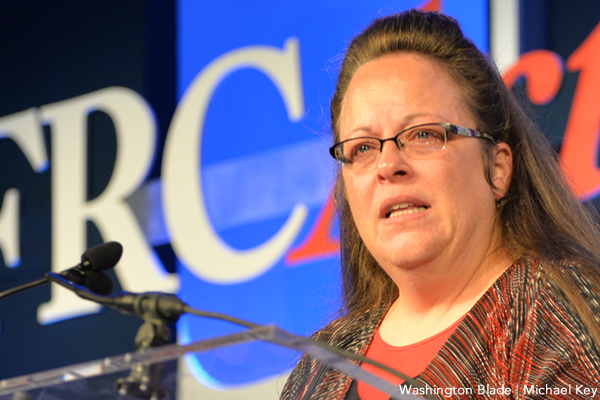
The U.S. Supreme Court has declined to hear an appeal from Kim Davis, the former Rowan County, Ky., clerk best known for refusing to issue marriage licenses to same-sex couples after the landmark 2015 Obergefell v. Hodges decision legalized same-sex marriage nationwide.
Following the Obergefell ruling, Davis stopped issuing marriage licenses altogether and has since filed multiple appeals seeking to challenge same-sex marriage protections. The court once again rejected her efforts on Monday.
In this latest appeal, Davis sought to overturn a $100,000 monetary award she was ordered to pay to David Moore and David Ermold, a same-sex couple to whom she denied a marriage license. Her petition also urged the court to use the case as a vehicle to revisit the constitutional right to same-sex marriage.
The petition, along with the couple’s brief in opposition, was submitted to the Supreme Court on Oct. 22 and considered during the justices’ private conference on Nov. 7. Davis needed at least four votes for the court to take up her case, but Monday’s order shows she fell short.
Cathy Renna, the director of communications for the National LGBTQ Task Force, a non-profit organization that works towards supporting the LGBQ community through grassroots organizing told the Los Angeles Blade:
“Today’s decision is not surprising given the longshot status of Davis’s claim, but it’s a relief that the Supreme Court will not hear it, given the current make up of the court itself. We hope that this settles the matter and marriage equality remains the law of the land for same-sex couples.”
Human Rights Campaign President Kelley Robinson released the following statement:
“Today, love won again. When public officials take an oath to serve their communities, that promise extends to everyone — including LGBTQ+ people. The Supreme Court made clear today that refusing to respect the constitutional rights of others does not come without consequences.
Thanks to the hard work of HRC and so many, marriage equality remains the law of the land through Obergefell v. Hodges and the Respect for Marriage Act. Even so, we must remain vigilant.
It’s no secret that there are many in power right now working to undermine our freedoms — including marriage equality — and attack the dignity of our community any chance they get. Last week, voters rejected the politics of fear, division, and hate, and chose leaders who believe in fairness, freedom, and the future. In race after race, the American people rejected anti-transgender attacks and made history electing pro-equality candidates up and down the ballot.
And from California to Virginia to New Jersey to New York City, LGBTQ+ voters and Equality Voters made the winning difference. We will never relent and will not stop fighting until all of us are free.”
This story is developing and will be updated as more information becomes available.
-
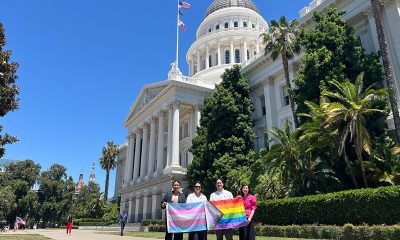
 Features1 day ago
Features1 day ago“We deserve to have a future here”: How we can support queer AAPI communities in 2026
-

 a&e features3 days ago
a&e features3 days agoQueer highlights of the 2026 Critics Choice Awards: Aunt Gladys, that ‘Heated Rivalry’ shoutout and more
-

 National3 days ago
National3 days agoTop 10 LGBTQ national news stories of 2025
-

 Events2 days ago
Events2 days agoGlowing tigers and butterflies will light up LA Pride’s first event this year at L.A. Zoo
-

 LGBTQ Non-Profit Organizations1 day ago
LGBTQ Non-Profit Organizations1 day agoPassing the brick: How MPJI is centering Black and Brown trans voices
-

 Commentary10 hours ago
Commentary10 hours agoRepeal now, regret later: Section 230 is up for elimination, and it’s not the platforms who will pay the price
-

 Viewpoint2 days ago
Viewpoint2 days agoFrom closeted kid to LGBTQ+ journalist: queer community is my guiding light
-

 a&e features2 days ago
a&e features2 days agoLooking back at the 10 biggest A&E stories of 2025
-

 a&e features10 hours ago
a&e features10 hours ago‘The Golden Girls’ writer Stan Zimmerman reflects on 40th anniversary, coming out, and working with Roseanne Barr
-

 Movies1 day ago
Movies1 day agoTig Notaro & Zack Snyder’s hot lesbian action film



